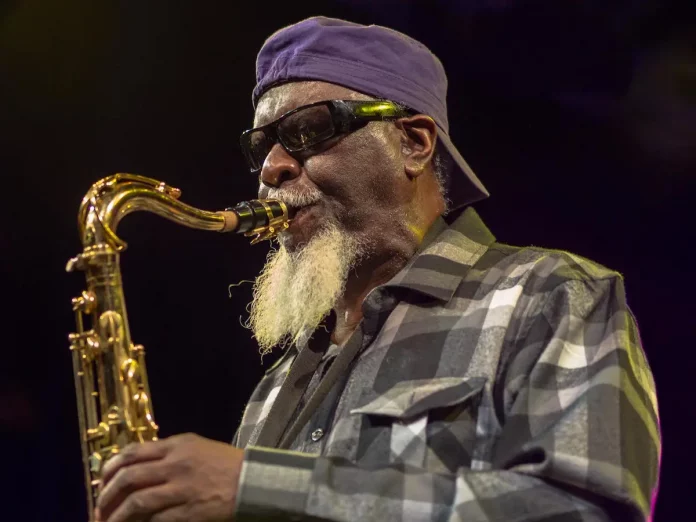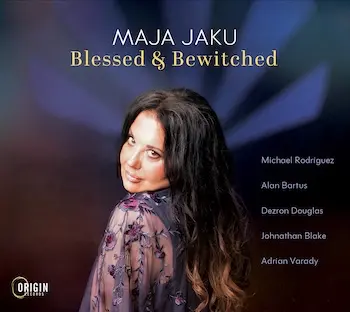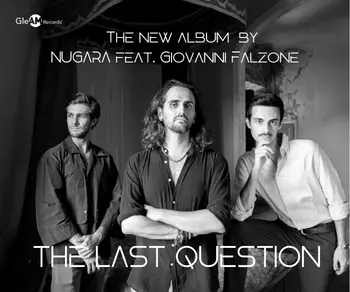Pharoah Sanders: The Complete Pharoah Sanders Theresa Recordings (Mosaic Records MD7 – 282)
As his 11 ecstatic, tumultuous outings with Impulse! Records recorded between 1966 and 1973 ran their course, saxophonist Pharoah Sanders stood back a bit in the late 1960s to take stock of his career, recording single albums for Strata-East and India Navigation and two commercial sets for Arista, including a string-laden crossover album that made him sound like Grover Washington. He then signed up with Theresa Records, a small but adventurous California label established in 1975 that was eventually bought up by Evidence Music, which reissued all its back catalogue on CD. Theresa must have been delighted to have scooped up Sanders, as it recorded six albums with him between 1979 and 1986, as well as two early outings as sideman. His entire Theresa catalogue has now been resurrected and remastered thanks to Mosaic Records, and will come as a considerable surprise to those brought up on the flamethrowing Impulse! days.
True, his screams and growls, and his use of multiphonics, split tones and overtones, remain, but it is his melodic and rhythmic intensity that now stand out, his clear delivery and honest approach. The opening Journey To The One set from December 1979 massively benefits from the rhythm section of the fleet and fluent John Hicks on piano and the formidable Ray Drummond on bass, with the versatile drumming of Idris Muhammad introducing what became a fruitful partnership, but then immediately surprises with three mediative tracks that showcase Sanders’s interest in Eastern cultures, and, in After The Rain, his continuing debt to John Coltrane, seven of whose songs appear over these six sets. Also featured here is Sanders’s return to standards, with a beautifully heartfelt treatment of the Rodgers and Hart classic (It’s) Easy To Remember, the first of several standards featured later. Only the synthesized soul tune Think About The One falls short, perhaps a perfunctory nod to Sanders’ own dalliance with fusion and an attempt at radio play?
And so a new mood is established, with a less frenetic, lighter approach, more introspective and spiritual, that continues over this entire collection. The Rejoice album from 1981 has a buoyant bounce to it, with some spirited African rhythms and a one-off appearance by Coltrane drummer Elvin Jones, as well as Billy Higgins and Bobby Hutcherson, while a live set in various venues from the same year has some of the fervour of a rousing, revivalist meeting, the opening You’ve Got To Have Freedom taken at a frantic pace with Sanders uttering shouty blues vocals before unrolling an affectionate reading of It’s Easy To Remember and ending with a fast and wild Doktor Pitt (debuted on Journey To The One). But despite the crowd pleasers, the overall feel is warm, rather than ecstatic. Nine months later, in January 1982, Sanders turned up in The Keystone Korner club in San Francisco to record Heart Is A Melody, now with William Henderson on piano, the first of his nine appearance with Sanders. A lengthy, fervent delivery of Coltrane’s Olé – originally filling the entire first side of the LP – commands attention, as Sanders slips into pure abstraction, as does his beautiful glide through Naima, but again the overall feeling of the set is a tad restrained, with the repetitive but melodic Sun Ra style chanted title track a frivolous interruption.
The biggest stylistic jump in the Theresa recordings comes two or three years later with Shukuru (“gratitude” in Arabic) – its 1984/85 recording date is uncertain – where pianist William Henderson switches to a Kurzweil synthesizer to reproduce strings, voices and even an acoustic piano! The opening title track is dreamy and smooth, as is that old warhorse Body And Soul, where Sanders takes Coltrane’s 1960 arrangement, with Giant Steps chord substitutions on the bridge, and plays the whole piece in leisurely time. Mas In Brooklyn is spirited but clichéd highlife, with vocal riffing and children’s song but no Sanders solo, while Latin Sun Song showcases the warm baritone and yodelling of singer Leon Thomas, who features on three tracks. Sanders confirms his touch with ballads on the disarming Too Young To Go Steady – made famous by Nat King Cole and included on Coltrane’s 1962 Ballads set – and on the concluding For Big George, based on the spiritual Goin’ Home, and only really stretches out on Jitu. All very acceptable, but hardly demanding.
Another gap now before Sanders and John Hicks recorded a duo version of After The Rain in February 1986 and then Sanders and William Henderson paired up to finish recording what became Sanders’s final Theresa recording, A Prayer Before Dawn, in September 1987. Like Shukuru, the set emphasises Sanders’s mellower side, even to the extent of including a cloying version of George Benson’s smooth soul hit The Greatest Love Of All – a commercial ploy to boost record sales? – and Mel Tormé’s oddly reassuring Christmas Song. Two pieces stand out: the Asian-tinged Midnight At Yoshi’s, with added drums, tabla, sarod and sarangi, Sanders playing an oboe-like double-reed instrument, and Coltrane’s Living Space, a majestic duo with Henderson that dominates the album and is as good as any definition of spiritual jazz.
And so ends Sanders’s six-album career retrospective in subdued style, augmented by just two earlier Theresa recordings. One is a quartet album from 1978 led by San Francisco pianist Ed Kelly – Sanders’ label debut – which is lightweight and inessential, other than its concluding and endearing Sam Cooke song, You Send Me, although it does give room for Sanders to test themes he would come to later, notably his debut performance of You’ve Got To Have Freedom. And finally, a 1980 piano-less outing in the Van Gelder studio in Englewood Cliffs, where Sanders partnered drummer Idris Muhammad on five tracks and which is notable for two versions of GCGC Blues with contrasting saxophonist George Coleman, as well as the modal burner St. M, on which Sanders revisits his incendiary fire music of the 1960s.
In retrospect, and inevitably, the Theresa albums do suffer in comparison with the commanding, overwhelming, Impulse! recordings, let alone Sanders’s earlier fine work with Coltrane, but they resist such reductive descriptions as safe or conservative. They represent not so much retrenchment as consolidation and growth, directing an already developed avant-garde approach along more mainstream lines. Their focus is precise, but once you get these albums in your focus, all will surprise, and some reveal themselves to truly magnificent.
Tim Boniface: Psalter: Themes For Peace (ECN Music ABCD 5033)
Other than drummer Spike Wells, I’m not sure I have ever come across an ordained priest in jazz before. But theologian Tim Boniface is the real deal, a chaplain and fellow of Girton College, Cambridge, as well as the artistic director of the Girton Jazz series of concerts and workshops, and importantly a fine jazz saxophonist, pianist and composer. So, in a most reverential way, let me introduce his new album, which comprises a suite of six texts from the Psalms concerning peace, and a bonus track, Kingdom Song, taken from a jazz suite on the eight sayings of Christ in the passion according to St John.
The six verses from the Psalms each take a different approach to peace, be it peace as rest, as something to be sought after or as something that can be deceptive, together attempting, as Boniface explains, “to get beyond simplistic notions of peace and explore its multiple social, political and spiritual dimensions through composition and improvisation in the jazz tradition”. This is not religious music, more a broadly themed instrumental work that understands the way jazz musicians improvise and communities of faith relate to their sacred texts. The music, all by Boniface, was record live at Girton, with no overdubs, and is played by a quartet, with the leader on alto and tenor saxes, James Pearson on piano, Malcolm Creese on bass and Jon Ormston on drums and percussion.
The introductory The Blessing Of Peace (Psalm 29) might mislead in its easy approach, but the quiet bluesy feel of In Peace I Will Lie Down And Sleep, (from Psalm 48) is sublime in its impact as Boniface tiptoes through the main theme, while Do Not Hold Your Peace At My Tears (Psalm 39) is more urgent. Righteousness And Peace Have Kissed Each Other (Psalm 85) is distinguished by Pearson’s strong piano solo and bassist Creese’s fine pizzicato solo, Peace On Their Lips, Malice In Their Hearts (Psalm 28) nicely bridging the dichotomy of the title in Pearson’s choppy solo. The band is comfortable in all moods and modes, Ormston an insistent drummer when required, Pearson a forceful and supportive pianist, while Boniface has a strongly personal voice than conveys both conviction and meaning.
I had not anticipated liking this album that much, but it is a fine and stirring release. The bonus track ends proceedings in reverential quiet, a suitable ending for a powerful and heartfelt album. May its message be heard loud and clear.
Joe Farnsworth: The Big Room (Smoke Session Records SSR-2502)
The Big Room of the title “isn’t a place”, explains drummer Joe Farnsworth, “but a spiritual dimension … a place where all the discipline, rules, and language that a musician spends a lifetime mastering suddenly fade, and pure, transcendent creation can occur”. In search of that place, Farnsworth has turned away – as on his previous Smoke Session release In What Direction Are You Headed? – from his usual cast of musical idols to a rota of younger musicians, notably saxophonist Sarah Hanahan and vibraphonist Joe Ross, with whom he had never worked with before.
After a blistering start on the Coltrane-influenced Continuance, the band glides through the pensive, dream-like What Am I Waiting For? and a swaggering blues, All Said And Done, written by trumpeter Jeremy Pelt. Best of all is the title track, an exploratory and ingenious duo between drums and vibes quickly followed by Ross’s second composition, the striking burner Radical. Add to these the set’s sole standard, a beautiful treatment of I Fall In Love Too Easily, and a rollicking You Already Know before the set closes with the leader’s own Prime Time, an exercise in Sidewinder-style groove with more than a nod to pianist Harold Mabern, one of his musical heroes. All said and done, this is the sort of polished, professional set one expects from Farnsworth. He doesn’t disappoint.




